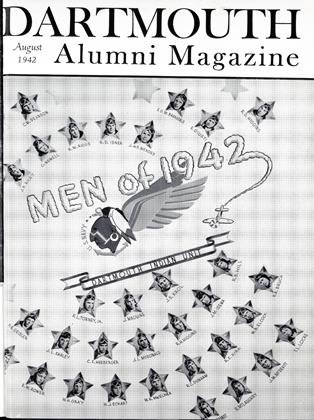General Observations
THE BASIC DOCUMENT for men interested in obtaining commissions in the USN is the
"Circular for the information of Persons Desiring Appointments as Officers, Cadets, Midshipmen, or Nurses, or Enlistments in the United States Naval Reserve." Anyone interested in obtaining a naval commission should secure a copy of this pamphlet and study it with care. It contains many details of procedure, information as to age limits, pay and allowances, technical designations of appointments, etc. impossible to summarize in a general article of this sort. If you cannot get a copy of this document at your nearest Navy recruiting station, you can get one from the Office of Naval Officer Procurement of your naval district, and any Navy recruiting station can give you the exact address.
(2) Correspondence regarding the possibility of obtaining commissions in one branch or another of the Navy, applications, and correspondence re-filed applications should be addressed to the Office of Naval Officer Procurement of your naval district and not direct to the Navy Department in Washington.
(3) The following list does not contain all the openings for naval commissions or reserve enlistments listed in the pamphlet, but is a brief summary of some of the more outstanding ones.
(4) Ten years U. S. citizenship, with residence in the United States for that period of time, is a general requirement for naturalized citizens.
DECK OFFICERS: The Navy system of procurement of junior officers tor general active, or "deck," service differs sharply from the Army in one regard: the Navy, unlike the Army, does not maintain schools for the training of enlisted men for commissioned rank. Naval officers on general service are either graduates of Annapolis, or of a Naval R.0.T.C., or graduates of the Navy V-7 program. Reserve commissions from civil life for the Navy are of a specialized character for specific types of duty. The lack of opportunity for enlisted men to advance to commissioned rank is modified by the fact that the higher grades of petty officers are very well paid, and that abundant opportunities to train for advancement as petty officers exist.
NAVAL V-7: Our rapidly expanding Navy is getting most of its young men for general or deck commissioned service via V-7 training from the graduating classes of schools and colleges. However, unmarried alumni (or those married whose wives will sign a dependency waiver), not yet 28, who have had a year of college mathematics and have had a course in Plane Trigonometry, are eligible. The training period is four months, one month as apprentice seaman, three months as midshipman, with graduation as ensign. Classes of men for V-7 training are periodically formed and quotas assigned to the several naval districts.
NAVAL AVIATION, V-5: Unmarried men not yet 27, are eligible for appointments as aviation cadets, provided they pass the exacting physical and psychological tests necessary. Upon completion of flight training they become naval aviators with the rank of ensign.
CIVIL AVIATION PILOTS: Licensed civilian pilots are eligible for appointment in this class. They must be under 40, with 300 hours pilot time, 100 of which must be in the past year, and be physically and psychologically qualified.
MEDICAL, DENTAL, CHAPLAINS: Like the Array, the Navy is in acute need of qualified practicing doctors, dentists, and of a more limited number of chaplains. The qualifications are set out in detail in the pamphlet.
INTELLIGENCE: For a time the Navy granted a number of commissions for Intelligence work to men specially qualified in languages, knowledge of foreign conditions, investigating experience, etc. Latest advices indicate that quotas are now full. However, a man with real knowledge of Japanese, Turkish, Arabic, long residence in the middle or far East, etc. might possibly be considered. An unusual skill actually needed by the Navy would be the criterion.
PUBLIC RELATIONS: Some commissions have been granted to active newspaper men, usually of experience on large city papers. Here again latest information indicates full quotas at present, but newspaper men might do well to keep in touch with their District Naval Officer Procurement Office.
COMMUNICATIONS: There is a chance for the alumnus with extensive practical experience in telephone, telegraph, cable or radio work to get a reserve commission for communications work.
ORDNANCE: Commissions in the Naval Reserve are granted to men with the technical or scientific knowledge needed to supervise, design, manufacture, testing, and development of ordnance material. They are normally granted to college faculty and commercial research men, or to men on the administrative engineering or technical staffs of manufacturing companies.
SUPPLY OFFICERS: The Navy is granting some reserve commissions in this branch, which is the "business side" of the Navy, to specially qualified, experienced men in the fields of purchase and supply, finance, accounting, transportation, foodstufEs, textiles and fuel. They are appointed for specific duties on recommendation of the Bureau of Supplies and Accounts. (From what the writer can learn, Dartmouth alumni have had better luck on Ordnance and Supply commissions in the Navy than on the Quartermaster and Ordnance commissions in the Army, though generalizations are notoriously unsafe.)
CIVIL ENGINEERS: The Navy will grant reserve commissions to experienced and active civil engineers of demonstrated technical ability and administrative leadership. Their duties would be design, construction and maintenance work in the many aspects of the naval shore establishment. Six years professional practice, two of them in responsible charge of professional work, is a required minimum.
LT. COL. MARVIN L. FREDERICK 'l5 Until recently supervisor of General Elec-tric business training course, Lt. Col.Frederick has been commissioned in thenewly created U. S. A. Specialist Corps,with duties in Washington.
 View Full Issue
View Full Issue
More From This Issue
Article
-
 Article
ArticleTHE SUMMER SESSION
July 1918 -
 Article
ArticlePresident Hopkins Speaks on Educational Unity
May 1933 -
 Article
ArticleTotal Contributors Increased 19 Times
April 1941 -
 Article
ArticleGive a Rouse for
JUNE • 1986 -
 Article
ArticleHOLD FAST WITH OPEN PALMS
April 1945 By Edward Kuhn '46 -
 Article
ArticleTucson
OCTOBER 1971 By SAUL DEITEL '35








